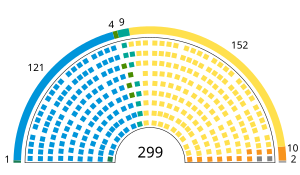South Korean legislative election, 2004
|
|
|||||||||||||||||||||||||||||||||||||||||||||||||
|---|---|---|---|---|---|---|---|---|---|---|---|---|---|---|---|---|---|---|---|---|---|---|---|---|---|---|---|---|---|---|---|---|---|---|---|---|---|---|---|---|---|---|---|---|---|---|---|---|---|
|
|||||||||||||||||||||||||||||||||||||||||||||||||
|
All 299 seats to the National Assembly of South Korea 150 seats needed for a majority |
|||||||||||||||||||||||||||||||||||||||||||||||||
|
|||||||||||||||||||||||||||||||||||||||||||||||||

|
|||||||||||||||||||||||||||||||||||||||||||||||||

■ Uri Party ■ GNP ■ DLP ■ ULD ■ MDP ■ National 21 ■ Others
|
|||||||||||||||||||||||||||||||||||||||||||||||||
Legislative elections were held in the Republic of Korea (South Korea) on April 15, 2004. In the 17th election for the National Assembly, voters elected 299 members of the legislature. The newly formed Uri Party and other parties supporting President Roh Moo-hyun, who was impeached by the outgoing National Assembly, won a majority of seats. This was the first time a centre-left liberal party won a majority in the National Assembly.
Left Center Right
Note: Changes in seats are the figures compared with the number of seats each party occupied as of 12 March 2004. In addition, the number of seats in the National Assembly has been increased from 273 to 299.
The newly formed Uri Party (Uri-dang or Our Party) gained support through its opposition to the impeachment of President Roh. It won 32 out of 49 seats in Seoul, 44 out of 62 in Incheon and Gyeonggi, confirming that a majority of voters supported the President.
The conservative Grand National Party, which supported the impeachment of Roh, suffered a loss of support, but won a majority in North Gyeongsang and South Gyeongsang regions and retained the 100 seats necessary to block constitutional changes.
The Democrat Labour Party won only 10 seats, but this was considered a great triumph considering that South Koreans are traditionally anti-communist and against left-wing policies.
...
Wikipedia



